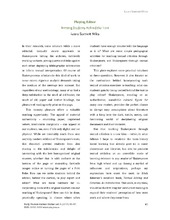Playing Editor: Inviting Students Behind the Text
Peer reviewed, Journal article
Published version

Åpne
Permanent lenke
https://hdl.handle.net/1956/12242Utgivelsesdato
2015Metadata
Vis full innførselSamlinger
Sammendrag
This commentary feature considers the advantages of using textual criticism to teach Shakespeare and using Shakespeare to teach textual criticism, at both the undergraduate and graduate level. First I discuss how to do this in practical terms, by suggesting some specific, concrete activities that bring an editorial approach into the classroom: interactive ‘editorial exercises’ that involve micro to macro textual problems. Then I discuss what is to be gained by teaching textual criticism through Shakespeare. Students can be profoundly transformed into critical thinkers and critical readers in four ways: 1) Healthy skepticism: i.e. undermining trust in editions, editors—and authority; 2) Healthy optimism: i.e. building a feeling of critical community; 3) Defamiliarizing the text and unsettling reading practices; 4) Combining a relish for puzzles, clues, data, detective work with the love of reading. In general this piece aims to be both a practical and philosophical consideration of the intersection of editing, Shakespeare, and teaching.
